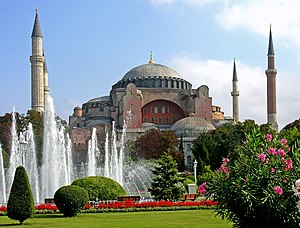
Back الدين في تركيا Arabic Türkiyədə din Azerbaijani Религия в Турция Bulgarian Religionen in der Türkei German Tırkiya de din DIQ Religión en Turquía Spanish دین در ترکیه Persian Religion en Turquie French तुर्की में धर्म Hindi Religija u Turskoj Croatian
Religion in Turkey  |
|---|
| Secularism in Turkey |
| Irreligion in Turkey |
While Turkey is officially a secular state, numerous surveys all show that Islam is the country's most common religion. Published data on the proportion of people in Turkey who follow Islam vary. Because the government registers everyone as Muslim at birth by default, the official statistics can be misleading. There are many people who follow other religions or do not adhere to any religion, but they are officially classified as 'Muslim' in official records unless they make a contrary claim. These records can be changed or even blanked out on the request of the citizen (by filing an e-government application since May 2020)[1] using a valid electronic signature to sign the electronic application.[2] According to the state, 99.8% of the population is initially registered as Muslim. The remaining 0.2% are Christians and adherents of other officially recognised religions such as Judaism.[3] As much as 90% of the population follows Sunni Islam. Most Turkish Sunni Muslims belong to the Hanafi school of jurisprudence.

Turkey has officially been a secular country since its 1924 constitution was amended in 1928. This was later strengthened and entrenched with the wider appliance of laicism by founder Atatürk during the mid-1930s, as part of the Republican reforms. When Turkey eventually applied to join the European Union some member states questioned whether a Muslim country would fit in. Turkish politicians have accused the country's EU opponents of favoring a "Christian club".[4]
While the state is officially secular, all primary and secondary schools have been required to teach religious studies since 1982, and the curriculum focuses mainly on Sunni Islam. The extent to which other religions are covered depends on the school. These policies have been met with controversy and criticism by both the foreign media and the Turkish public. The high school curriculum, however, teaches religious studies through a philosophy (Felsefe) course and incorporates more information about other religions. The country also has public Islamic schools called İmam Hatip schools, which came to prominence in the 1950s. The schools vary in their curriculum and whether they teach Arabic.
Beginning in the 1980s, the role of religion in the state has been a divisive issue, as influential religious factions challenged the complete secularization called for by Kemalism and the observance of Islamic practices experienced a substantial revival.[5] In the early 2000s, Islamic groups challenged the concept of a secular state with increasing vigour after Recep Tayyip Erdoğan's Islamist-rooted Justice and Development Party (AKP) came into power in 2002. Turkey was historically a religiously diverse country in the past. On the eve of World War I, the predecessor of today's Turkey, the Ottoman Empire, had 20% of the population as non-Muslims. The non-Muslim population significantly decreased following the late Ottoman genocides, population exchange between Greece and Turkey and emigration of Jews and Christians.[citation needed]
- ^ "e-Devlet'te yeni hizmet: Din değişikliği yapılabilecek". A3 Haber (in Turkish). 23 May 2020. Archived from the original on 22 November 2020. Retrieved 11 October 2020.
- ^ "Nüfus Kaydındaki Din Bilgisi Değişikliği Başvurusu". www.turkiye.gov.tr (in Turkish). Archived from the original on 22 November 2020. Retrieved 11 October 2020.
- ^ "Turkey". World Factbook. CIA. 2007. Archived from the original on 10 January 2021.
- ^ "Muslims in Europe: Country guide". BBC.co.uk. Archived from the original on 29 September 2009. Retrieved 31 January 2016.
- ^ Öztürk, Ahmet Erdi (26 February 2019). "An alternative reading of religion and authoritarianism: the new logic between religion and state in the AKP's New Turkey" (PDF). Southeast European and Black Sea Studies. 19: 79–98. doi:10.1080/14683857.2019.1576370. ISSN 1468-3857. S2CID 159047564. Archived (PDF) from the original on 22 November 2020. Retrieved 3 June 2020.